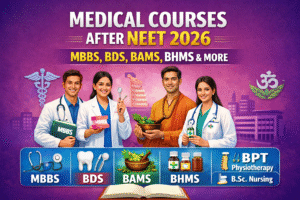Geology is one of the most popular optional subjects chosen by aspirants of the Indian Forest Service (IFoS) Mains Exam, and it has a reputation for being scoring and systematic in its preparation. Geology, as an optional subject, is advantageous because of its scientific nature and its overlap with other subjects like General Studies (Environment, Science & Technology, etc.), which helps aspirants in both their Mains and Prelims preparation.
This article provides a comprehensive overview of the Geology Optional for IFoS Mains, including the syllabus, preparation strategy, tips, and previous year questions to help you plan your studies effectively.
1. Why Choose Geology as an Optional for IFoS?
- Scoring Subject: Geology is considered a scoring subject due to its factual and objective nature. It has fewer grey areas as compared to humanities subjects.
- Overlap with Other Subjects: Geology overlaps with other subjects in the General Studies syllabus, especially topics related to Environment and Ecology, Science & Technology, and Geography.
- Structured and Systematic Preparation: The syllabus is well-defined, and if you have a keen interest in earth sciences, preparation can be streamlined and focused.
- Availability of Resources: There are abundant resources available for Geology preparation, including books, previous year papers, and online material.
2. Syllabus for Geology in IFoS Mains
The Geology syllabus for IFoS Mains is divided into two papers—Paper I and Paper II. Below is a detailed breakdown of the syllabus.
Paper I: (Physical Geology, Geomorphology, Remote Sensing)
Section A: Physical Geology
- Earth’s Origin and Evolution
- Internal Structure of the Earth
- Volcanoes and Volcanic Activity
- Earthquakes and Seismology
- Continental Drift, Plate Tectonics, and Isostasy
- Crystallography and Mineralogy
- Weathering and Soil Formation
Section B: Geomorphology
- Geomorphological Features and Processes
- Landforms and their Evolution
- Geomorphic Classification of Landscapes
- Coastal and Marine Landforms
- River Landforms and Drainage Patterns
- Fluvial Processes and Landforms
Section C: Remote Sensing & Geographical Information Systems (GIS)
- Introduction to Remote Sensing
- Satellite Imagery and Data Analysis
- GIS Applications in Geology
- Principles of Remote Sensing
- Remote Sensing in Natural Resource Mapping
Paper II: (Stratigraphy, Paleontology, Structural Geology, and Economic Geology)
Section A: Stratigraphy and Paleontology
- Geological Time Scale
- Classification of Fossils
- Geological Principles of Stratigraphy
- Biostratigraphy
- Fossils and their Role in Age Determination
Section B: Structural Geology
- Structural Features and Geological Structures
- Stress and Strain in Rocks
- Folds, Faults, and Joints
- Plate Tectonics and its Implications
- Mountain Building and Deformation
Section C: Economic Geology
- Ore Formation and Mineral Deposits
- Exploration of Mineral Resources
- Coal, Petroleum, and Natural Gas
- Economic Importance of Major Minerals
- Geology of Mineral Deposits (Iron Ore, Copper, Gold, etc.)
3. How to Prepare for Geology in IFoS Mains
1. Understand the Syllabus and Exam Pattern
- Familiarize yourself with the detailed syllabus of both Paper I and Paper II. Divide the syllabus into smaller chunks and prioritize topics based on their weightage.
- Review previous year questions to understand the pattern and important areas of focus.
2. Build Strong Fundamentals
- Start by understanding the basic concepts of Geology, including crystallography, minerals, tectonics, and geomorphology.
- Make a solid foundation in Physical Geology before moving on to more complex topics like Economic Geology and Structural Geology.
3. Use Standard Books and Study Materials
- Physical Geology and Mineralogy:
- Physical Geology by A. C. L. Taff (for basics)
- Manual of Mineralogy by James D. Dana
- Geomorphology:
- Geography of India by Majid Husain
- Fundamentals of Geomorphology by Richard Huggett
- Stratigraphy and Paleontology:
- Principles of Stratigraphy by A. E. W. Keighley
- Palynology by T. H. Visscher
- Economic Geology:
- Economic Geology by S. K. Ghosh
- Geology of India by M. S. Krishnan (for reference)
4. Focus on Diagrams and Case Studies
- Practice sketching diagrams like volcanic structures, folds, faults, and geological maps. This is crucial as they often form an integral part of the answer.
- Take case studies from India (e.g., Indian coal reserves, petroleum fields) to make your answers more contextual and relevant.
5. Join a Test Series
- Consider joining a test series for Geology. Regular mock tests will help you improve your writing speed and refine your approach to answering questions.
6. Revision and Practice
- Revise consistently to retain complex topics like economic geology and structural geology.
- Previous year questions and sample papers should be regularly solved to gauge your preparation and identify weak areas.
4. Previous Year Questions (Geology – IFoS)
Sample Questions from Paper I:
- Describe the process of weathering and its effects on the formation of soil.
- What are the major landforms formed by glacial processes?
- Explain the theory of plate tectonics with suitable examples.
- Discuss the formation of volcanic landforms.
Sample Questions from Paper II:
- Describe the geological time scale and its subdivisions with reference to the Indian stratigraphy.
- What are the main economic minerals found in India? Discuss their importance.
- Explain the structure and formation of folds and faults.
- Discuss the exploration and production of petroleum in India.
5. Additional Tips for Success
- Stay updated with current developments in geology, especially in the context of India’s natural resources and environmental challenges.
- Focus on conceptual clarity in topics like tectonics and stratigraphy, which form the core of the syllabus.
- Stay consistent and develop a practical study schedule that incorporates revision, regular tests, and addressing weak areas.
Conclusion
Choosing Geology as an optional subject for IFoS Mains can be a rewarding decision if you have an interest in earth sciences. The subject is scoring, systematic, and overlaps with other parts of the syllabus, making it a strategic choice for forest service aspirants.
With proper planning, understanding of the syllabus, and consistent revision, you can crack the Geology paper in the IFoS Mains exam.
Good luck with your preparation, and remember, perseverance and regular practice will take you a long way in mastering the subject!







